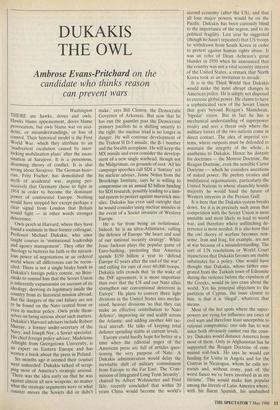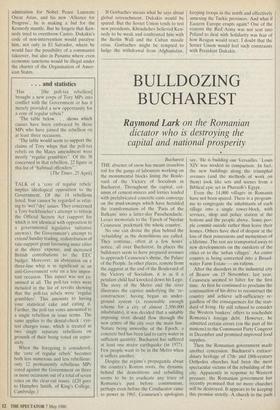DUKAKIS THE OWL
Ambrose Evans-Pritchard on the candidate who thinks reason can prevent wars
Washington THERE are hawks, doves and owls. Hawks blame appeasement, doves blame Provocation, but owls blame war on acci- dents, or misunderstandings, or loss of control. Their historical model is the First World War, which they attribute to an `inadvertent escalation caused by inter- locking mobilisation plans' after the assas- sination at Sarajevo. It is a poisonous, disarming theory of conflict. It is also wrong about Sarajevo. The German histo- rian, Fritz Fischer, has demolished the myth of accidental war, arguing per- suasively that Germany chose to fight in 1914 in order to become the dominant Power of continental Europe. Nothing would have stopped her except perhaps a Clear signal from London that Britain would fight — in other words stronger deterrence.
Owls perch at Harvard, where they have found a soulmate in their former colleague, Professor Michael Dukakis, who once taught courses in 'institutional leadership and agency management'. They offer the theology to buttress his faith in the miracu- lous power of negotiations in an ordered world where all differences can be recon- ciled. There is not a single beaky hawk in Dukakis's foreign policy coterie, no Brze- zinski to remind him that the Soviet Union IS inherently expansionist on account of its ideology, deriving its legitimacy inside the country from its historical mission abroad. But the dangers of the owl fallacy are not to be found on the Nato central front or even in nuclear policy. Owls pride them- selves on being serious about such matters. Dukakis's Harvard advisers include Robert Murray, a former under-secretary of the Navy, and Joseph Nye, a Soviet specialist. His chief foreign policy adviser, Madeleine Albright from Georgetown University, is an expert on Eastern Europe and has written a book about the press in Poland. Six months ago it seemed their counsel went unheeded. Dukakis talked of scrap- Ping most of America's strategic arsenal. 'There was the idea early on that he was against almost all new weapons, no matter What the strategic arguments were or what counter moves the Soviets did or didn't make,' says Bill Clinton, the Democratic Governor of Arkansas. But now that he has run the gauntlet past the Democratic primary pacifists he is shifting smartly to the right: the nuclear triad is no longer in danger. He will continue development of the Trident H D-5 missile, the B-1 bomber and the Stealth aeroplane. He will keep the MX missile and even consider the develop- ment of a new single warhead, though not the Midgetman, on grounds of cost. All his campaign speeches call SDI a 'fantasy' yet his nuclear adviser, Janne Nolan from the Brookings Institute, says he is willing to compromise on an annual $2 billion funding for SDI research, possibly leading to a limi- ted system to protect against maverick mis- siles. Dukakis has even said outright that he would consider using nuclear missiles in the event of a Soviet invasion of Western Europe. He is far from being an isolationist. Indeed, he is an ultra-Atlanticist, calling the defence of Europe 'the heart and soul of our national security strategy'. While Jesse Jackson plays the popular game of Euro-bashing, protesting that America spends $150 billion a year to 'defend Europe 42 years after the end of the war', and calling for cuts of over 60,000 troops, Dukakis tells crowds that 'in the wake of the INF agreement, it is more important than ever that the US and our Nato allies strengthen our conventional deterrent in Europe'. He plans to convert three light divisions in the United States into mecha- nised, heavier divisions 'so that they can make an effective contribution to Nato defence', improving air and sealift across the Atlantic, and adding another 440 tac- tical •aircraft. He talks of keeping total defence spending stable at current levels. Europe could hardly hope for better at a time when the editorial pages of the American press are full of articles ques- tioning the very purpose of Nato. A Dukakis administration would delay the inevitable shift of military commitment from Europe to the Far East. The 'Com- mission of Integrated Long Term Security', chaired by Albert Wohlstetter and Fred Ikle, recently concluded that within 20 years China would become the world's second economy (after the US), and that all four major powers would be on the Pacific. Dukakis has been curiously blind to the importance of the region, and to its political fragility. Last year he suggested (though he hasn't repeated) that US troops be withdrawn from South Korea in order to protest against human rights abuse. It was an echo of Dean Acheson's great blunder in 1950 when he announced that the country was not a vital security interest of the United States, a remark that North Korea took as an invitation to invade.
It is in the Third World that Dukakis would make the most abrupt changes in American policy. He is simply not disposed to exercise global power. He claims to have a sophisticated view of the Soviet Union that goes beyond Reagan's Manichean, 'bipolar' vision. But in fact he has a mechanical understanding of superpower rivalry and sees a threat only where the military forces of the two nations come in direct contact. The idea of imperial sys- tems, where outposts must be defended to maintain the integrity of the whole, is anathema to Dukakis. Hence his distaste for doctrines — the Monroe Doctrine, the Reagan Doctrine, even the sensible Carter Doctrine — which he considers assertions of naked power. He prefers treaties and multilateral organisations, particularly the United Nations to whose staunchly hostile majority he would hand the future of Western interests in the Persian Gulf.
It is here that the Dukakis system breaks down, for it is in precisely such areas that competition with the Soviet Union is most unstable and most likely to lead to world war, and therefore where unflinching de- terrence is most needed. It is also here that the owl theory of warfare becomes non- sense. Iran and Iraq, for example, are not at war because Of a misunderstanding. The sort of UN resolutions or World Court injunctions that Dukakis favours are risible substitutes for a policy. One would have thought that Dukakis, whose father emi- grated from the Turkish town of Edremite during the violence before the expulsion of the Greeks, would be less crass about the world. Yet his principal objection to the partition of Cyprus, the issue closest to him, is that it is 'illegal', whatever that means.
Most of the hot spots where the super- powers are vying for influence are cases of civil wars and therefore least susceptible to rational compromise: one side has to win since both obviously cannot run the coun- try. Dukakis would distance America from most of them. Only in Afghanistan has he supported the Reagan Doctrine of com- munist roll-back. He says he would cut funding for Unita in Angola and for the Contras in Nicaragua, whom he calls ter- rorists and, without irony, part of 'the worst fiasco we've been involved in in my lifetime'. This would make him popular among the literati of Latin America where, with his fluent Spanish, his unabashed admiration for Nobel Peace Laureate Oscar Arias, and his new 'Alliance for Progress', he is making a bid for the Kennedy mantle. But he forgets that Ken- nedy tried to overthrow Castro. Dukakis's code of non-intervention would paralyse him, not only in El Salvador, where he would face the possibility of a communist takeover, but also in Panama where even economic sanctions would be illegal under the charter of the Organisation of Amer- ican States. If Gorbachev means what he says about global retrenchment, Dukakis would be spared. But the Soviet Union tends to test new presidents. Khrushchev believed Ken- nedy to be weak and confronted him with the Berlin Wall and the Cuban missile crisis. Gorbachev might be tempted to fudge the withdrawal from Afghanistan, keeping troops in the north and effectively annexing the Turkic provinces. And what if Eastern Europe erupts again? One of the reasons the Red Army was not sent into Poland to deal with Solidarity was fear of how Reagan would react. I doubt that the Soviet Union would feel such constraints with President Dukakis.























































 Previous page
Previous page